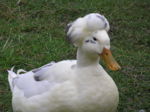Coccidiosis - Duck
Introduction
Coccidiosis in ducks in not well researched or studied, but it is a common disease in both farmed and wild ducks and can cause significant morbidity and mortality when there is no resisitance developed (therefore disease is more common in farmed ducks, whereas subclinical infections are predominant in wild ducks).
Currently 13 species of coccidia have been reported in ducks but only certain species have been researched. Eimeria, Wenyonella or Tyzzeria genuses are found in wild and farmed birds.
There are several pathogenic strains with some Eimeria species producing caseous core lesions in the caecum as well as petechial haemorrhages and congestion. Other species are known to cause severe enteritis and pale focal lesions in the small intestine. Sloughing of the intestinal wall in long sheets may also be seen and the coccidia may invade very deep to the muscular layers of the intestinal wall.
Another coccidia species which produces 8 sporozoites but these are not enclosed in a sporocyst
Causes severe enteritis and mortality in ducklings
- Haemorrhages and pale focal lesions in small intestine
